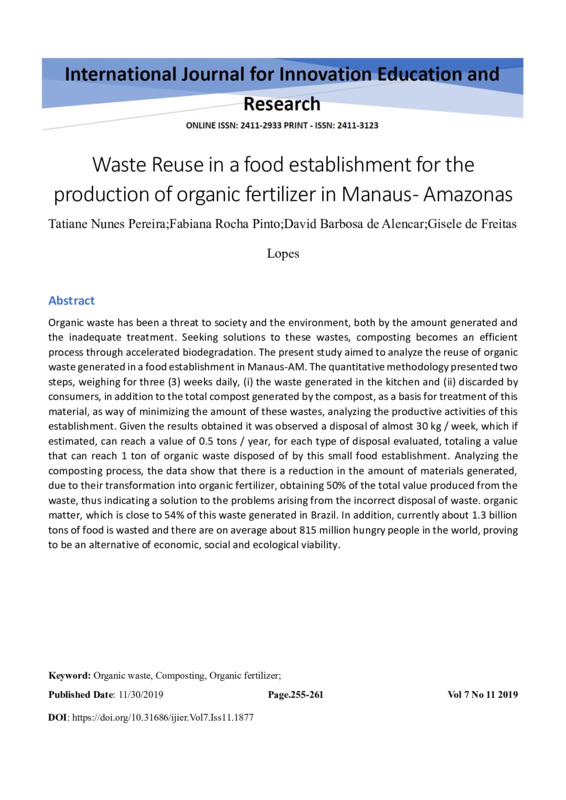-
Tipo do ITEM
-
Artigo Ciêntifico
-
Título do Artigo
-
Waste Reuse in a food establishment for the production of organic fertilizer in Manaus - Amazonas
-
Descrição
-
Abstract
Organic waste has been a threat to society and the environment, both by the amount generated and
the inadequate treatment. Seeking solutions to these wastes, composting becomes an efficient
process through accelerated biodegradation. The present study aimed to analyze the reuse of organic
waste generated in a food establishment in Manaus-AM. The quantitative methodology presented two
steps, weighing for three (3) weeks daily, (i) the waste generated in the kitchen and (ii) discarded by
consumers, in addition to the total compost generated by the compost, as a basis for treatment of this
material, as way of minimizing the amount of these wastes, analyzing the productive activities of this
establishment. Given the results obtained it was observed a disposal of almost 30 kg / week, which if
estimated, can reach a value of 0.5 tons / year, for each type of disposal evaluated, totaling a value
that can reach 1 ton of organic waste disposed of by this small food establishment. Analyzing the
composting process, the data show that there is a reduction in the amount of materials generated,
due to their transformation into organic fertilizer, obtaining 50% of the total value produced from the
waste, thus indicating a solution to the problems arising from the incorrect disposal of waste. organic
matter, which is close to 54% of this waste generated in Brazil. In addition, currently about 1.3 billion
tons of food is wasted and there are on average about 815 million hungry people in the world, proving
to be an alternative of economic, social and ecological viability.
Keyword: Organic waste, Composting, Organic fertilizer;
-
Abstract
-
Abstract
Organic waste has been a threat to society and the environment, both by the amount generated and
the inadequate treatment. Seeking solutions to these wastes, composting becomes an efficient
process through accelerated biodegradation. The present study aimed to analyze the reuse of organic
waste generated in a food establishment in Manaus-AM. The quantitative methodology presented two
steps, weighing for three (3) weeks daily, (i) the waste generated in the kitchen and (ii) discarded by
consumers, in addition to the total compost generated by the compost, as a basis for treatment of this
material, as way of minimizing the amount of these wastes, analyzing the productive activities of this
establishment. Given the results obtained it was observed a disposal of almost 30 kg / week, which if
estimated, can reach a value of 0.5 tons / year, for each type of disposal evaluated, totaling a value
that can reach 1 ton of organic waste disposed of by this small food establishment. Analyzing the
composting process, the data show that there is a reduction in the amount of materials generated,
due to their transformation into organic fertilizer, obtaining 50% of the total value produced from the
waste, thus indicating a solution to the problems arising from the incorrect disposal of waste. organic
matter, which is close to 54% of this waste generated in Brazil. In addition, currently about 1.3 billion
tons of food is wasted and there are on average about 815 million hungry people in the world, proving
to be an alternative of economic, social and ecological viability.
Keyword: Organic waste, Composting, Organic fertilizer;
-
Língua do arquivo
-
inglês
-
Data da Publicação
-
Ano 2019
-
Palavra-chave
-
Organic waste
-
Composting
-
Organic fertilizer
-
Autores
-
Tatiane Nunes Pereira
-
Fabiana Rocha Pinto
-
David Barbosa de Alencar
-
Gisele de Freitas Lopes
-
Local
-
ITEGAM - Manaus, 2019


